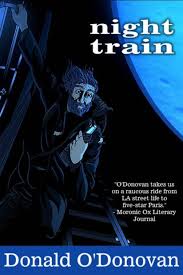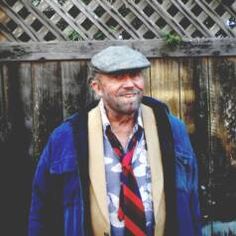Donald O’Donovan’s Night Train Tunnels Through the Belly of the Great American Beast
ADAM MICHAEL LUEBKE
Los Angeles
Within the first few weeks after I’d moved to Los Angeles, I was sitting outside at a coffee shop on Wilshire and Western, and an older gentleman in argyle-patterned socks and scuffed sandals high-stepping by on the sidewalk stopped and asked what I was writing in my notebook. I told him I was working on a short story that I couldn’t quite seem to get right on a computer, so I thought if I rewrote some of the scenes on paper, I might nail it.
 The man said his name was Lester T Hopkins and he’d actually developed a working model of the universe. His oversized fishing vest had about a dozen pockets lining its front, and I became nervous about what he might be keeping in them.
The man said his name was Lester T Hopkins and he’d actually developed a working model of the universe. His oversized fishing vest had about a dozen pockets lining its front, and I became nervous about what he might be keeping in them.
“If you’d like to see,” he said of his theory, “I’ll be happy to draw it up for you on that notebook. But I’ll need your pen to show you.”
Through the din of traffic starting and stopping at the intersection lights, Lester T Hopkins sat across from me and scribbled in my notebook while explaining each step. Rather than using a blank page, he crammed a series of circles, as well as key phrases and measurements in the margins beside my story. We sat for half an hour while he talked and I nodded. “Now this is what you need to know before I explain the meat of it to you,” he said.
There was the whooshing sound of a city bus stopping. Lester’s head popped up. He pushed his glasses higher on his nose and squinted at the bus. “I have to catch that one!” he shouted and hopped out of his chair. Lester’s thin white legs scurried across the street. The pattern of his socks became a black and red vortex beneath his shorts. The bus doors shut, and he screamed, “I’m coming!” He waved his hand. The bus doors opened, and he lunged inside, taking his theory of the universe with him, as well as my chance to understand reality once and for all.
I glanced back over Lester T’s notes for a few minutes and realized I hadn’t understood one goddamned word he’d said. The model he’d drawn looked like nothing more than squiggles. I could hear his voice still, long after the bus disappeared down the street:
“It won’t be decades before science puts their fingers on this, and I don’t suppose I’ll be getting credit for it, neither. Not all of us are immortalized in the great American novels and science textbooks! We are swallowed and forgotten in the belly of the Beast.”
When I finally recalibrated my brain to rewrite the short story I’d set out to finish, I found Lester had taken my pen with him.
A couple of years later I would stumble onto the works of a Southern California writer named Donald O’Donovan, who was busily mapping his own vision of the universe, but instead of providing a blueprint for cosmic reality, O’Donovan hands us a far more revealing, coherent sketch of a tiny, almost always overlooked subset of Los Angeles society in his novel Night Train.
As strange and memorable as Lester T Hopkins was for me, he would not even earn a minor role with the cast of characters that Donald O’Donovan writes about during his time living on the streets of LA.
Night Train is a brutal, yet humorous testimony to the least understood among us. O’Donovan’s experience comes firsthand and details the lives of men and women not found in most other novels. Instead, it showcases a vast parade of unique, exuberant characters trudging through the underbelly of the Great American Beast.
There’s Jack, the chronic liar with delusions of grandeur, who’s successfully dug out a series of tunnels beneath an abandoned building, which eventually houses vagabonds, bums, and even a family thrown into the street due to financial hardship.
Living under a bridge is Mungy Nuncie, a woman who has “little seal flippers” instead of arms, and she becomes a hit by turning tricks for successful businessmen who have fetishes to “get it on with a deformed woman” (12).
And then there’s aging Corliss, a rich, lonely dame from Brentwood who takes in the impoverished narrator, Jerzey Mulvaney, and puts him up in her pool shed, except he starts to realize he’s expected to “shtup her off”, and he can’t do it because he can’t bear that her “…hands were fish-belly white and they were speckled with brown spots” (55).
These characters are only the beginning of the cast Mulvaney meets throughout his voyage of odd jobs and strange bedfellows. Listen to O’Donovan read an excerpt from his novel about Corliss:
Night Train’s themes are not always pleasant ones, but they are more agreeable particularly because of the inspiring strength and good nature of the narrator. Aptly fitting the novel’s microscopic gaze of the medieval squalor on the grimy streets of the Kingdom of Los Angeles, Mulvaney likens his existence in Big Bluto’s sweatshop, as well as his underpaid band of ragged coworkers, to that of intestinal parasites in the guts of a bustling society where big capitalists and wealthy property owners are the slumlords, and everyone else must be constantly working and sweating for their daily bread.
“We’re the parasites, aren’t we? We’re the hookworms, the tapeworms, the liver flukes and the pinworms. We’re everywhere now, there’s no escaping us. March us off to war, starve us out, banish us to the streets, a million more spring up” (32), he thinks.
There’s not a better novel or American novelist who depicts with enduring clarity the confused, bright, leering, dirty faces of the millions of beleaguered opportunists in this country, both rich and poor, some with good intentions, and others who would slit another’s throat for a nickel.
Night Train is very funny, but sobering and unsuspectingly heartbreaking, too. The narrator is so pleasant and amiable throughout his dealings with the good and bad folks he finds on the streets, that often the wretchedness and misery of poverty, addiction, and superficial emptiness plaguing the characters aren’t pondered upon until many moments later, when O’Donovan’s musical language and lurid descriptions finally settle in the psyche and, all at once, the depth of despair is realized.
For all O’Donovan’s lavishness and quality of writing, he is shrewd and judicious with his scenes and characters, keeping only on the page what is needed to drive the story forward. I oftentimes paused after the ending of a chapter to relive the scene just a little longer – if only O’Donovan had spun out a few more pages! This is especially the case with Mulvaney’s occasional revelations throughout the book, revelations that combine real life street experience with a profound literary learnedness, and concentrated into a few potent sentences that are easily digested but not forgotten.
During Mulvaney’s two-week stint as a convincing Frankenstein in the Monster Mansion on a carnival midway at the Del Mar Fair, he is often abused and cursed and almost physically beaten by some members of the crowd who are taking the tour through the haunted mansion. Mulvaney says of the crowd:
“They cursed and spat. They reviled me. It was uncanny. I never knew what to expect. I even had a jamoke pull a knife on me. I got hit with a basket of rotten tomatoes. Some society bitch tried to stick me with a hatpin. She came right up on stage after me. She was crazy with hatred. They hated me. And they were right in heaping me with abuse, right in venting their indignation, because they’d paid their three bucks.
“I was the scapegoat, the Jew, the exile, the nemesis, the pariah. I was Frankenstein, Moloch, Goliath, Minotaur. I was the grinning hyena that waits at the end of the night. I was The Reason: fucking car won’t start, baby’s crying, bastards are after you for back payments. Arthritis, termites, dandruff, haven’t had a decent orgasm in five years, wrinkles, dirty dishes, bills piling up, muggy weather, ants, lawnmower’s broken, toilet clogged, phone jangling. All the little Golgothas…” (138).
There are no lackluster passages or boring sections in this book. O’Donovan does not show off with his talents, nor does he play language games. He’s got too many stories to tell, too many situations to describe, and far too many characters that deserve their printed legacy—out of O’Donovan’s energetic imagination and locked into the fixed, tuneful lines of prose on the page.
Night Train tunnels through the rarely seen, rarely acknowledged lower levels of American society, and more attention will be paid to the alleyways, and every darkened corner. The reader might never again experience a great American city in the same way he did before reading this book, especially not Los Angeles.

Night Train by Donald O’Donovan
Open Books, 2010
180 Pages
[overview of L.A. photo by Andy]




There are no comments at the moment, do you want to add one?
Write a comment